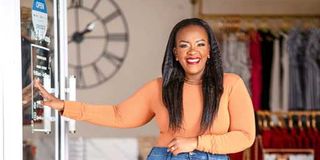
Adelle Onyango; Founder of Legally Clueless Podcast poses for a photo during the InnovateHER Brunch on April 27, 2024.
In a dimly lit studio tucked away in Nairobi’s Kilimani neighbourhood, 32-year-old podcaster Sam Wanjiru adjusts his microphone, presses ‘record’, and leans into the mic with a smile. “Today, we’re talking about men and mental health. Raw, unfiltered. Let’s go.”
It’s a Tuesday evening, and thousands of Kenyans—commuting, cooking, or unwinding after work—are already tuned in.
This is the sound of a revolution. Podcasting in Kenya has moved from the fringes of digital media into a powerful tool for self-expression, storytelling, and cultural commentary. What began as an experimental platform a few years ago is now a full-blown movement, offering a voice to the voiceless and an audience to the unheard.
The numbers tell part of the story. According to a 2024 report by GeoPoll, Kenya ranks among the top three podcast-consuming nations in Africa, trailing only Nigeria and South Africa. The country’s youth, who form more than 75% of the population, are embracing podcasts as a flexible and personal form of media. With rising internet penetration, cheaper smartphones, and a desire for more authentic content, audio storytelling is becoming a daily companion.
“I started podcasting because I was tired of gatekeeping in traditional media,” says Murugi Munyi, co-host of The Messy Inbetween, a popular show that explores love, friendship, and womanhood in Nairobi. “Radio had its format, TV had its politics, but podcasting gave me freedom. And people were hungry for realness.”

Murugi Munyi is the co-host of The Messy Inbetween, a popular show that explores love, friendship, and womanhood in Nairobi.
Murugi’s show, co-hosted with Lydia KM, is one of several Kenyan podcasts that have built large, loyal audiences both locally and in the diaspora. They speak freely—sometimes hilariously, sometimes painfully—about everything; from toxic relationships to body image. Their episodes rack up tens of thousands of downloads and are regularly shared across social media.
Another podcast stirring the scene is Mic Cheque, hosted by Mariah, Austin, and Owen, a trio in their late twenties who banter over music, pop culture, and Gen Z life. What sets them apart isn’t just the chemistry, but the sense of belonging they offer listeners. In many ways, their podcast feels like eavesdropping on a night out with friends.
“It’s not about being perfect. We record in a simple space, but we’re intentional,” says Owen. “Podcasting is about vibes, yes, but also about voicing issues that matter to us—like mental health, creatives being underpaid, or how social media shapes self-worth.”
The intimacy of podcasting is part of its magic. Without visuals, the voice becomes a conduit for vulnerability. Listeners feel like they’re being spoken to directly. This intimacy, combined with on-demand access, is why podcasting appeals so strongly to Kenya’s mobile-first generation.
But it’s not just the younger crowd jumping in. Former radio personalities are also finding a second wind through podcasting. Adelle Onyango, once a radio darling, left mainstream media to create Legally Clueless, a podcast that amplifies African stories—often those unheard in traditional platforms. With over 2 million downloads and a partnership with Trace, her show is both proof and product of podcasting’s potential.
“I wanted to hear African stories without filters,” says Adelle. “Podcasting has no borders. I have listeners in Eldoret, Lagos, and New York. That tells you something about how powerful this medium is becoming.”
The topics covered in Kenyan podcasts span an impressive spectrum. Some shows dive into music and film criticism, such as The 30% Podcast and Cinema Conversations KE. Others, like Nipe Story by journalist Kevin Mwachiro, bring African fiction to life through spoken word. There’s also a growing crop of vernacular podcasts that cater to rural and peri-urban audiences hungry for culturally grounded content.
Sally Kuria, a Nairobi-based podcaster and host of Mama Tales, ventured into podcasting in 2021 after becoming a mother. Although she discovered podcasts in 2011, she hadn’t come across any Kenyan or African ones at the time. Her show, Mama Tales, was born out of a desire to document and share her parenting journey in a raw and relatable way.

Sally Kuria is a mother of 2 and she hosts Mama Tales podcast, a platform for mothers to discuss pregnancy and motherhood.
“For the first three episodes, I talked about my experience with no limit,” she says. Her husband later joined to share his own fatherhood story. Soon after, she received requests from other parents wanting to share their journeys. What began as an informal storytelling space quickly morphed into a growing platform and budding business.
Kuria’s podcast focuses on real, everyday parenting experiences—something her audience strongly relates to. “A lot of them identify with me because that is where I am at,” she said. Her primary audience is mothers with young children, especially first-time mums navigating the newness of parenthood.
Her story mirrors a broader trend across Africa where podcasts are creating virtual communities for self-expression, advocacy, and challenging traditional narratives—especially in areas under-represented in mainstream media.
Still, podcasting in Kenya isn’t without its hurdles. Monetisation remains a significant hurdle for Kenyan podcasters, despite the medium’s growing popularity. Unlike platforms like YouTube, which offer direct ad revenue, podcast platforms often lack clear income models—especially for African content creators. As a result, many podcasters rely on brand sponsorships, merchandise sales, and live events to sustain their shows.
According to Statista, Kenya’s podcast advertising revenue in 2024 was projected at US$175,000 (Sh22.63 million). With an expected annual growth rate of 3.46%, by 2027 it is projected to reach a market volume of US$193,800 (Sh25.06 million). While this indicates positive growth, the average revenue per user remains low, underscoring the challenges podcasters face in generating consistent income.
Some Kenyan podcasters, however, are finding creative ways to make podcasting viable. The Mics Are Open podcast, hosted by G Money, Andy Young, and Calvin Wanguku, has managed to monetise through merchandise sales, sponsorship deals with brands like Safaricom and Adidas, and major visibility campaigns like billboards and digital ads.
Adelle Onyango’s Legally Clueless podcast has also turned heads. With over a million streams and a syndication deal with Trace FM, she’s expanded into podcasting workshops and brand collaborations, turning her platform into a profitable venture.
Still, these are the exception rather than the norm. Many podcasters turn to side hustles—Patreon pages, exclusive content, or crowdfunded support—to keep their shows alive. Mariah from Mic Cheque puts it plainly: “We’ve had to be creative. Merchandise, live shows, Patreon—anything to keep it going. But it’s worth it. The love we get from our listeners makes it more than just content—it becomes community.”
The Joy Ride Podcast, hosted by Ben Cyco and Wanjiru Njiru, also offers a glimpse into how creators are building business models around their shows.

Ben Cyco and Wanjiru Njiru arethe spouses who are famed for their Joyride podcast that focuses on relationships.
The Joy Ride Podcast has built a strong community by blending candid conversations on relationships, adulthood, and personal growth with a youthful, relatable flair—making it one of Kenya’s most popular podcasts.
“We make money through different streams,” says Ben Cyco. “YouTube pays us, we have The Joy Ride game, we’ve partnered with brands, and we also run brand experientials—live events where audiences can engage with us and the brands we work with.”
He believes podcasting is no longer just a niche, urban trend. “Soon, podcasting will grow upcountry too. Podcasters will be able to control their audiences and people will finally get to tell their own stories in their own voices,” he adds.
As Kenya’s podcast scene matures, more structured monetisation paths are expected to emerge. For now, passion, creativity, and community support are the glue holding much of the industry together.
Another roadblock is discoverability. With over 5 million podcasts globally, cutting through the noise can be hard. But this hasn’t stopped Kenyan creators. Instead, they’re leaning into their authenticity, crafting hyper-local content that resonates deeply with audiences.
Spotify and Apple Podcasts have played a major role in this growth, giving Kenyan podcasters global exposure. Last year, Spotify’s Africa Podcast Fund selected several Kenyan shows—including The Sandwich Podcast and Tea With Winnie—for funding and training, further cementing Nairobi’s status as a regional podcasting hub.
There’s also the quiet rise of niche content. In Nakuru, a schoolteacher runs a podcast that discusses disability rights in Swahili. In Mombasa, a youth-led podcast explores Afro-Arab heritage and coastal identity. These shows may not chart globally, but they are invaluable archives of lived experience.
What then, is the future of podcasting in Kenya? According to data and interviews with creators, it’s expansive. Podcasting is no longer the preserve of Nairobi’s cool kids. It’s entering schools, churches, community radio stations, and creative collectives. It’s becoming a mirror—sometimes foggy, sometimes clear—of what it means to live, love, and grow in Kenya today.
And while the format evolves, the mission remains: to tell stories, stir conversations, and spark change—one episode at a time.
As the buzz grows louder, Kenya’s podcasting wave isn’t just riding on a trend. It’s carving a path for the next era of African media—voice first, heart-led and boldly unfiltered.





